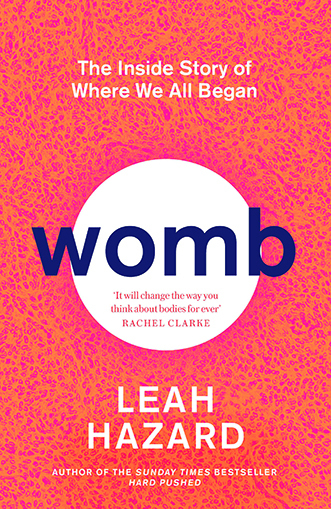
Leah Hazard was a journalist before re-training as an NHS midwife and she has a lovely descriptive writing style with lots of humour to balance the somewhat heavy content. This is her third book, after the huge success of Hard Pushed: a Midwife’s Story, a book I now want to read.
Womb is an unashamedly feminist book exploring anatomy, science, and history related to the female genital tract. The author brings the topic alive by not only describing historical research but also exploring the researchers’ lives and considering the women involved in the research. I learnt the history of primitive menstrual cycle tracking through to modern-day tracking apps, early caesarean section, and the discovery of syntocinon and some of the unintended consequences of its widespread use today.
She describes her interviews with leading researchers, and their work and theories for the future. Could analysing menstrual blood aid diagnosis without the need for invasive investigations? Could there one day be uterus transplants for women struggling to conceive? Could babies be grown outside of the body in the future? And what are the ethics of doing that?
Her description of approaching a pregnant woman to examine her is beautiful and reminds me of the honour it is to be trusted by a patient and the importance of trying to understand the uniqueness of the person before you. Her admiration for the process of pregnancy and labour, as well as the individual women she is treating, radiates from the page.
Hazard is candid about her personal womb history including her own investigations for menorrhagia. It is humbling to be reminded of what it feels like to be a patient. She describes her exploration of alternative medicine including ‘squatting bare-vadged over a pot of tepid herbs on my bathroom floor’, possibly the most wonderfully descriptive sentence ever written in a medical book! She discusses many cultural traditions as well as the current trend for ‘womb wellness’ and, while she does emphasise the potential harms and ineffective mechanisms, I think non-medical readers could possibly be influenced by such a highly trained professional trying vaginal steaming for her own symptoms. As a GP, menorrhagia is a condition I am extremely keen for patients to consult me on as I have seen the dramatic difference we can make to women’s lives. However, I understand her point that women can feel forced to seek out alternative treatments when they feel dismissed by conventional medicine and that the treatments we offer do not work for everyone. Perhaps GPs could learn from alternative medicine’s empathy and acknowledgement of suffering — but I’d like to lose the false promises and expensive price tag.
The book discusses the importance of medical language and how this can be perceived by patients, for example, ‘incompetent cervix’ and ‘hostile or irritable uterus’. However, I found that the way the author commented on traditional science and medicine in relation to transgender people difficult to understand.
In the book, Hazard states that ‘Medical tradition … has long insisted that sex is binary, and that gender is fixed at birth.’ While I agree that medicine does see sex as binary (genotype XX or XY that is usually suggested by genital phenotype at birth), I don’t agree that medicine ‘assigns’ gender; I think that in fact it is society that imposes gender onto people. While I understand that this language is used in the interests of inclusivity, I do find Hazard referring to women as ‘uterus havers’ or ‘menstruaters’ very reductive and potentially confusing to some groups of women, such as those for whom English is not their first language.
However, I really enjoyed this book and learnt a great deal about the history of obstetrics, gynaecology, and midwifery as well as the potential future direction of research. Hazard is passionate about her area of expertise, and she wants women to feel empowered and listened to.
To sum up, I don’t think anyone could read the book and not want to do better by women.
Footnotes
This review was first posted on BJGP Life on 21 May 2023; https://bjgplife.com/womb


